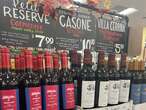New listeria concerns now hit Costco this week. This time, the impacted product was in the seafood aisle.
Acme Smoked Fish Corp. issued a voluntary recall of packages of its smoked salmon including Kirkland Signature Smoked Salmon “due to potential contamination with Listeria monocytogenes.”
Costco advised customers to return the product to stores for a full refund and apologized for the inconvenience, saying the company has taken steps to “ensure that this never happens again.”
However, the seafood recall is one of several to hit Costco this month alone.
The retailer also recently recalled multiple chicken products, mainly related to ready-to-eat meat producer BrucePac. The company issued a recall of more than 10 million pounds of meat on Oct. 9 before recalling additional items days later, which included Rana Chicken Truffle Carbonara and Tagliatelle Grilled White Chicken & Portobello Mushroom Sauce meal kits. Other stores impacted include Trader Joe’s, Aldi, Target, Publix, and Walmart.
Before that recall, Readywise 110 Serving Emergency Protein Bucket, Red’s Southwestern Grill Chicken Mini Burritos, and El Monterey Mexican Grill Chicken & Cheese Taquitos were also recalled.
A series of other outbreaks have been in the news lately. A recent E. Coli outbreak just hit fast food chains like McDonald’s, sickening at least 49 and killing one. We also just saw a frozen waffle recall over listeria risks. And contamination at a Boar’s Head deli meat plant in Virginia led to 10 deaths last month.
Concerns around listeria and other outbreaks have been ramping up lately. Listeria monocytogenes can cause fever, nausea, diarrhea, and other sickness in healthy individuals. But it can lead to severe infections, especially in young children, those with weakened immune systems, and the elderly.
Experts say that the uptick in outbreaks is largely because our food is more processed than ever, which requires a more complicated food system. Dr. Darin Detwiler, a food safety adviser, author, and professor at Northeastern University, tells Fast Company that the food system “has grown increasingly complex over the past few decades, largely due to globalization.” That means an increase “in demand for fresh and ready-to-eat products and a drive for efficiency” that creates a food system with many more steps.
Detwiler says that Ready-to-Eat products are at an increased risk for contamination. “These products skip consumer preparation steps, which means any contamination that happens earlier in the supply chain can reach consumers directly.” Plus, the more steps in the process, the greater the risk. “For example, technologies like vacuum-sealing or modified atmosphere packaging, designed to extend shelf life, can also create environments where certain pathogens thrive, like Listeria in refrigerated, sealed packaging,” Detwiler adds.
According to the Center for Disease Control (CDC) and Prevention, an estimated 1,600 people get listeriosis each year, with 260 fatalities resulting.
The recent listeria recall at Costco underscores the unique vulnerabilities of ready-to-eat products, which, as Dr. Darin Detwiler notes, are particularly susceptible to contamination due to minimal consumer preparation. With convenience often prioritized, the intricate supply chain and extended shelf-life technologies can inadvertently create conditions for harmful pathogens to thrive.











No comments